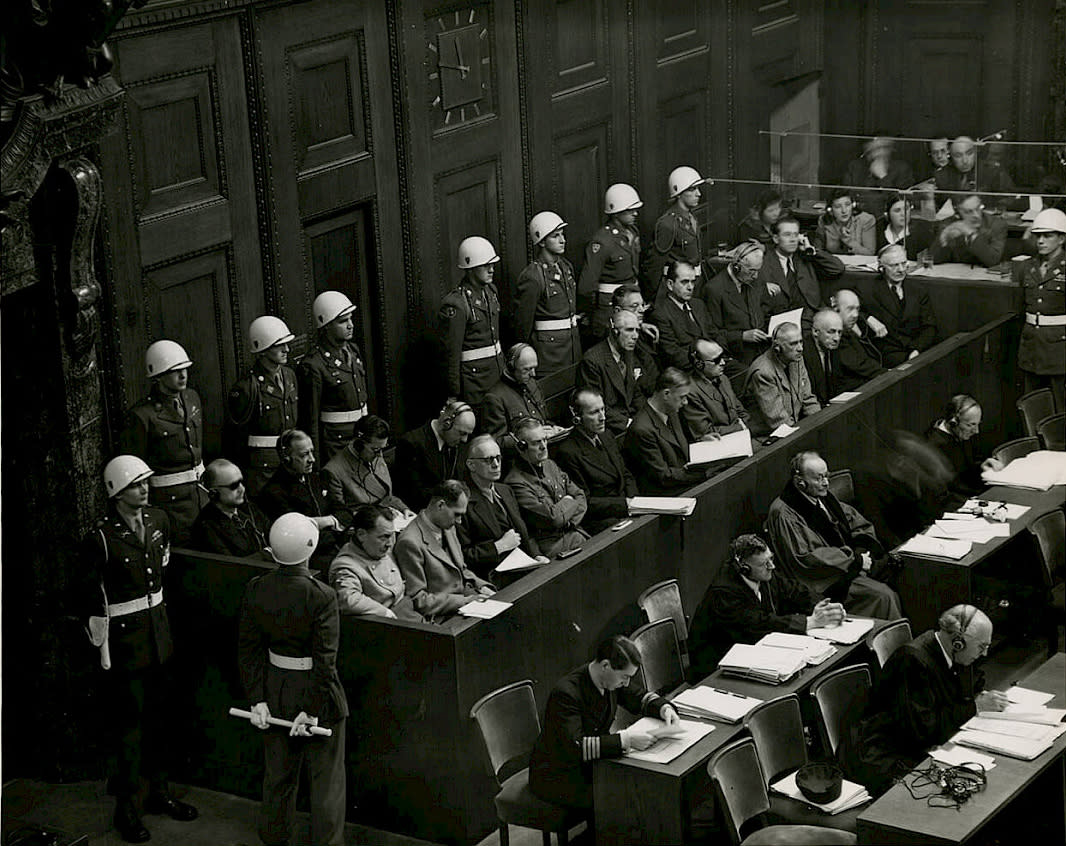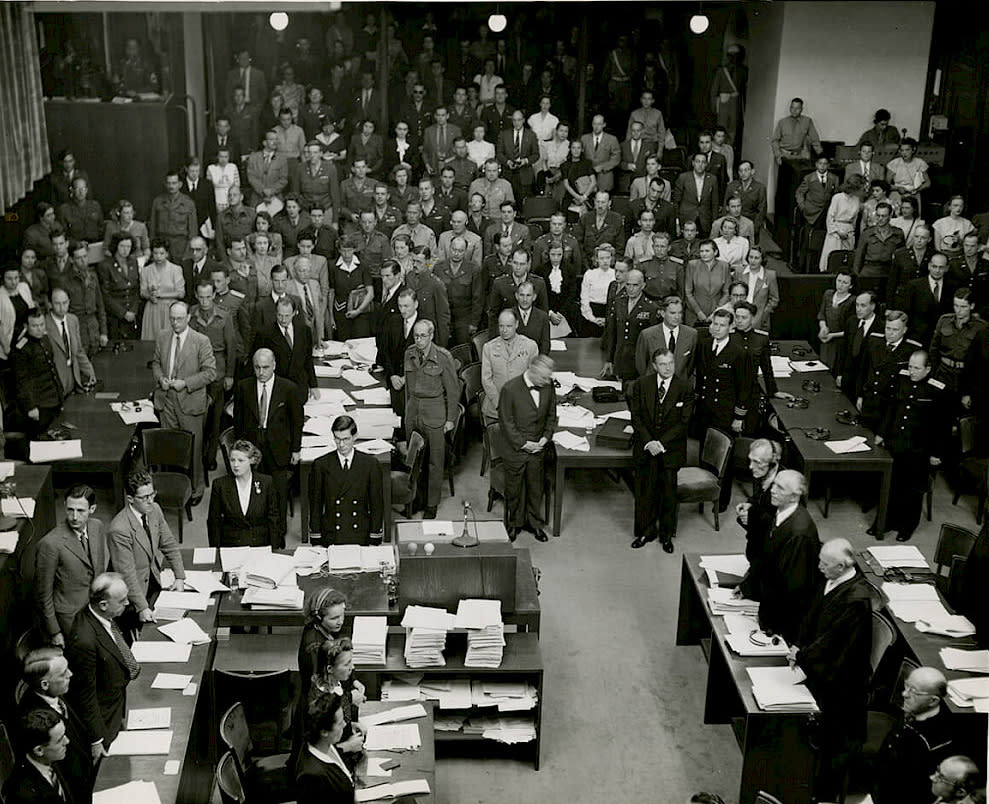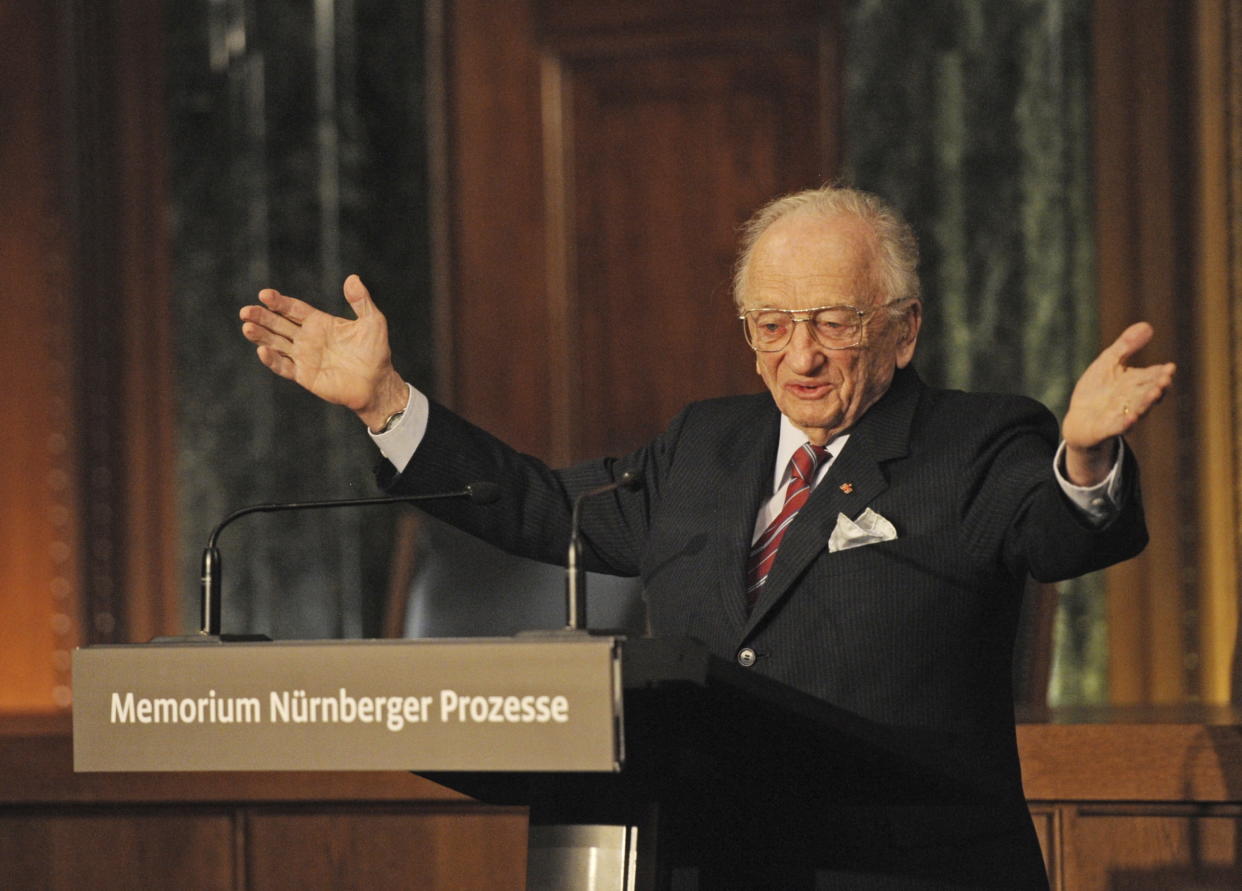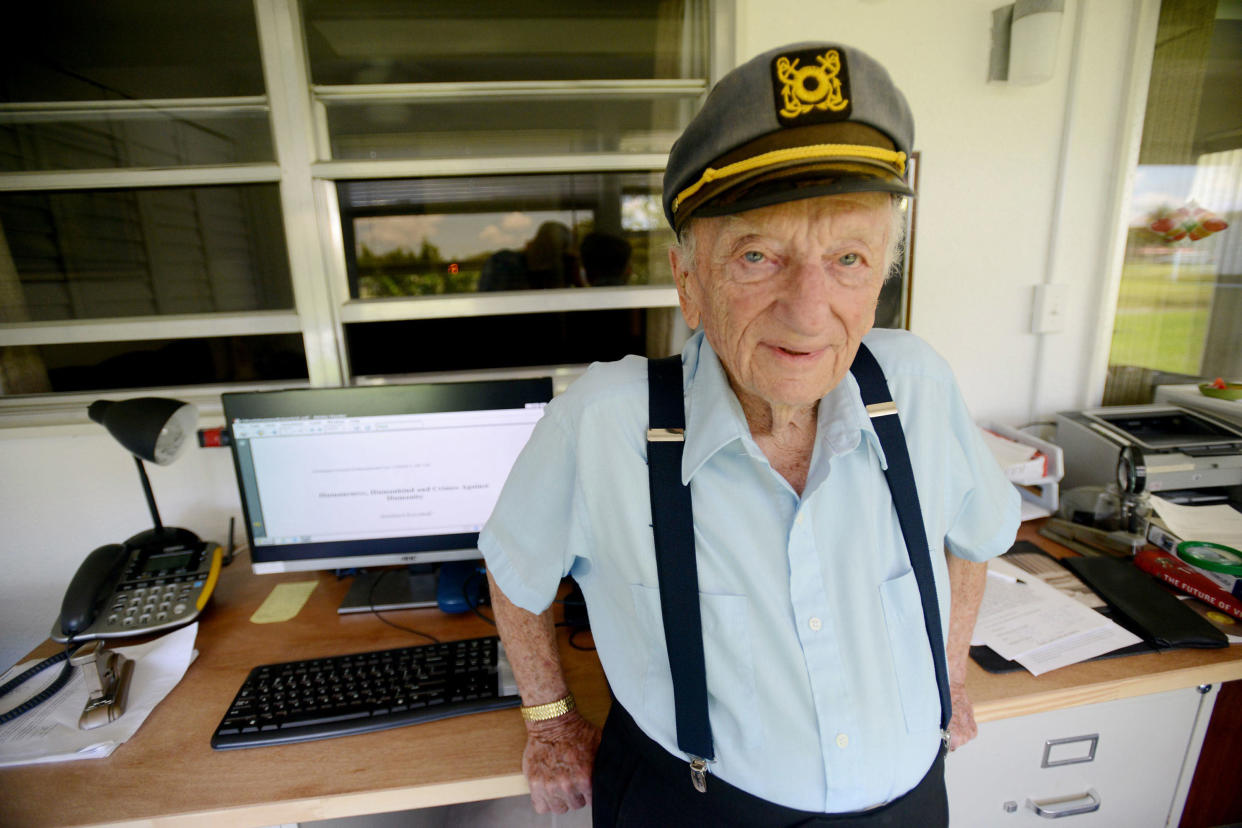Nuremberg prosecutor Ben Ferencz saw hell — but never lost hope in peace on earth

At one of the Nazi concentration camps the U.S. Army liberated at the end of World War II, Benjamin Ferencz watched as prisoners caught a Nazi guard, beat him and then shoved him into the same infernal crematorium where untold numbers of Jews and other prisoners had been turned into mounds of ash.
“They slid him in the oven, turned on the heat and took him back out. Beat him again, and put him back in until he was burnt alive,” Ferencz told the Washington Post in 2005.
At the time, Ferencz was a 25-year-old Harvard Law School graduate. The son of Jewish immigrants from Romania, he had enlisted in 1943 and fought at Normandy with an artillery battalion. Having become something of an expert in war crimes during his Harvard days, Ferencz was tasked by the Army with chronicling the atrocities perpetrated by Germany, both in the battlefield (he investigated the extrajudicial killings of U.S. airmen) and behind barbed wire, deep in the Polish countryside.
The scope of the wholesale extermination of European Jews was becoming apparent throughout 1945 as Allied forces liberated concentration camps and recorded the horrors for all the world to see. Until then, the genocidal campaign (which also claimed hundreds of thousands of Roma people, political prisoners and gays and lesbians) had been the stuff of horrifying rumor that many outside occupied Europe simply could not believe.
The rumors were true.
“I had peered into Hell,” Ferencz would later write.

Ferencz did not intervene as the Nazi guard was shoved back into the crematorium by his former captives. But he would never forget the moment, nor the hasty military tribunals held by the U.S. Army at Dachau, the first Nazi concentration camp, after the war ended in the spring of 1945, and revulsion at what Germany had done turned into a vengeful anger.
The Dachau trials of Hitler’s willing executioners did not impress the young Harvard Law graduate. “I think the average time of trial per defendant was about two minutes,” Ferencz would recall, with several dozen of the guilty Germans executed by the United States.
These were acts of vengeance, not justice, he thought. The executions gave a false sense of closure, as he would later write: “I felt that it might trivialize the magnitude of the crimes by suggesting that it could be settled, and perhaps then forgotten, by executing a handful of genocidal killers. We owed it to the millions of victims to try to give their deaths some greater significance.”
Ferencz, who died on April 7 at the age of 103, would make it his life’s mission to ensure that any figure or regime that perpetrated war crimes would be held to account in a way that produced lasting change, not merely the satisfaction of seeing war criminals brought down once and for all.
He lived according to a simple maxim that he strove to bring into reality: “Law, not war.”
And though he is most famous for his work on the Nuremberg trials that brought Nazi leaders and functionaries to justice, Ferencz would spend decades trying to universalize the lessons of World War II. He helped found the International Criminal Court (ICC) and was an unstinting critic of American resistance to joining the institution.
“War makes murderers out of otherwise decent people. All wars, and all decent people,” he told “60 Minutes” in 2017.

That conviction led him to strongly criticize the George W. Bush administration for its wars in Afghanistan and Iraq, and for what he described as a refusal to abide by international norms. He was also an unstinting opponent of former President Donald Trump. In early 2020, he denounced the Trump administration’s assassination of top Iranian military official Qassem Soleimani.
“It was a thin disguise for plain murder,” Ferencz said in a statement released on Twitter. “The order to kill General Soleimani violated everything the U.S. stood for at Nuremberg and brought shame to our great country.”
Ferencz was summoned back to Germany in late 1945 to help build the case against the 22 military and political leaders of Nazi Germany. (Adolf Hitler as well as Heinrich Himmler, the onetime chicken farmer who had become Hitler's dreaded SS chief, had both already killed themselves.) The proceeding would come to be known as the Nuremberg International Military Tribunal.
The chief U.S. prosecutor, Supreme Court Justice Robert H. Jackson, delivered an opening statement almost Shakespearean in its sweep. The “broken men” now facing justice, he said, were almost beside the point. “Merely as individuals their fate is of little consequence to the world,” Jackson said. “What makes this inquest significant is that these prisoners represent sinister influences that will lurk in the world long after their bodies have returned to dust.”
Nineteen of the defendants were convicted. Of them, all but seven were sentenced to death. Once they had been the masters of what they delusively envisioned as a “thousand-year Reich.” Now they ascended to the gallows, condemned by an unprecedented court where Soviet and American prosecutors toiled side by side.

In 1947, Ferencz — then only 27 years old — would preside over what he would himself call the biggest murder trial in world history, when he was placed in charge of prosecuting 12 members of the Einsatzgruppen death squads that had shot and killed Jewish men, women and children between 1939 and 1941 in what has come to be known as the “Holocaust by Bullets.”
The men who had gleefully dispatched thousands to their deaths in ditches had not been deranged outcasts unrecognizable to normal Germans. Instead — as Christopher Browning would chronicle in his landmark book “Ordinary Men”— some of Hitler’s most zealous butchers were doctors and lawyers, cultured family men so seized by the fervor of antisemitism that they saw nothing wrong with murdering babies. If anything, they relished in the horrors they unleashed.
“One of the defendants had been an opera singer, and another a Lutheran clergyman,” Ferencz wrote of the Einsatzgruppen defendants. “One thing they all had in common was a fervent desire to serve their Fuehrer, even if that meant killing enormous numbers of innocent men, women, and children.”
In his opening statement at the 1947 trial, Ferencz alluded to Jackson’s words from two years earlier, invoking a vision of justice beyond just German guilt and Jewish suffering. Those were, of course, undeniable factors in the Holocaust, and the killers would get their due. But what of future generations? What of killing fields beyond Russia, Lithuania and Poland?
Perhaps the most lasting tribute to the victims of the Holocaust would be a regime of international law that, in the future, would not tarry as demagogues drove their adherents to murder innocents and commit atrocities.

“Vengeance is not our goal,” Ferencz said. “Nor do we seek merely a just retribution. We ask this court to affirm by international penal action man’s right to live in peace and dignity, regardless of his race or creed. The case we present is a plea of humanity to law.”
Several of the defendants were given death penalties, a punishment that Ferencz had not sought. He was disturbed by that sentence, canceling a party he’d planned to hold after the trial was over.
Equally disturbing were the reactions of the convicted. Ferencz went to see Otto Ohlendorf, a father of five and economist who was widely seen as the most articulate of the defendants. Even as he faced death, Ohlendorf showed no contrition. “Jews in America would suffer for what I had done,” he said, Ferencz would later recall. Ohlendorf’s enduring hatred rattled him. “I was stunned by his answer. The man had learned nothing, and regretted nothing.”
Born in 1920, Ferencz was brought by his peasant parents from a Transylvanian village to the West Side of Manhattan. He earned admission to Townsend Harris, one of the city’s best public schools, and then to the City College of New York, an intellectual hothouse then known as the “Jewish Harvard.” Ferencz represented an American generation that saw the United States as a force for good in the world.
Vietnam would complicate that vision; Afghanistan and Iraq would, for some, efface it altogether. Still, he believed that the United States could recover its moral force. In particular, he saw the ICC as the best means for preserving the legacy of Nuremberg as a living example of international law at work.

In 2012, he offered remarks at the conclusion of the ICC’s first trial, in which Congolese warlord Thomas Lubanga Dyilo was charged with “conscripting and enlisting children under the age of fifteen years” into his army.
Standing in a courtroom in The Hague, Netherlands, the 92-year-old Ferencz reprised, briefly, the role for which he had become famous many decades before. “Let the voice and the verdict of this esteemed global court now speak for the awakened conscience of the world,” he told the court.
Lubanga was convicted and sent to prison. He was freed in 2020.
A prolific writer and public speaker, Ferencz leavened his dark subject matter with humor. And unlike many of his colleagues in the legal profession, he was not shy about dispensing his opinion.
Most importantly, he never gave up hope — not after he saw the atrocities of the Nazi death camps, nor as the 21st century seemed to repeat all too readily the mistakes of the 20th century.
“Despite lapses and regressions, we learn, and are learning, from errors of the past,” he wrote in 1986. “There is nothing inevitable about war or peace; whether we survive or not depends on us.”
That hope, that faith in humanity that was so frequently contradicted by what humans did to each other, would stay with him until the very end.
In 2013, the Harvard Crimson asked Ferencz about his guiding principles.
“Peace and dignity,” he replied. “That has been my credo all my life and remains the same today. We have to have a world where all people are entitled to live in peace and freedom, regardless of their race or creed.”



